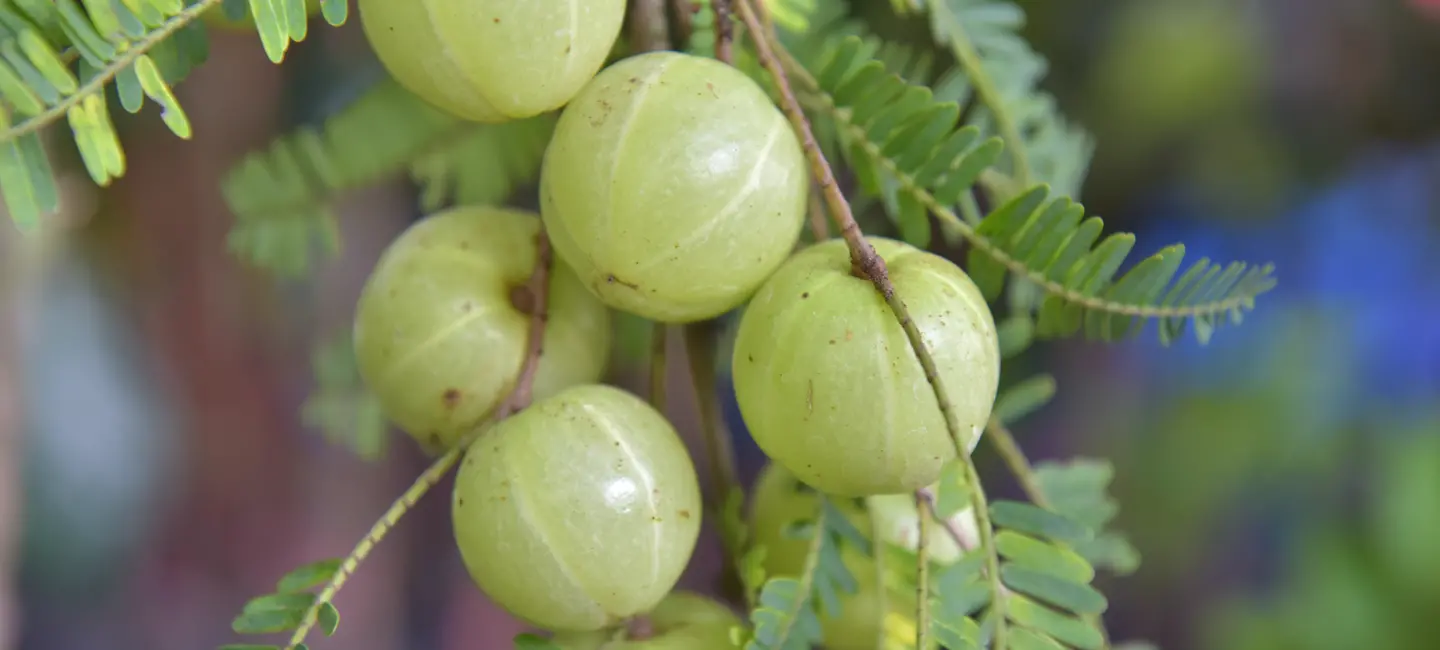
Indian gooseberry (Phyllanthus emblica) is a tree native to India and the Middle East. It's been used in Ayurvedic medicine for thousands of years.
Indian gooseberry seems to work by reducing total cholesterol levels, including the fatty acids called triglycerides, without affecting levels of high-density lipoprotein (HDL or "good") cholesterol.
People commonly use Indian gooseberry for abnormal cholesterol levels and persistent heartburn. It's also used for diarrhea, osteoarthritis, and cancer, but there is no good scientific evidence to support these uses.
Is It Effective?
NatMed Pro rates effectiveness based on scientific evidence according to the following scale: Effective, Likely Effective, Possibly Effective, Possibly Ineffective, Likely Ineffective, Ineffective, and Insufficient Evidence to Rate.
- Abnormal levels of cholesterol or blood fats (dyslipidemia). Taking a specific Indian gooseberry whole fruit extract (Tri-low, Arjuna Natural Ltd.) for 12 weeks decreases low-density lipoprotein (LDL or "bad") cholesterol and fats called triglycerides.
- Persistent heartburn. Taking Indian gooseberry fruit extract for 4 weeks helps reduce how often heartburn occurs and how severe it is.
There is interest in using Indian gooseberry for a number of other purposes, but there isn't enough reliable information to say whether it might be helpful.
Is it Safe?
When taken by mouth: Indian gooseberry is commonly consumed in food. It is possibly safe when used as medicine at doses of up to 1,000 mg daily for up to 6 months, 1,500 mg daily for up to 2 months, and 2,000 mg daily for up to 1 month. It is unclear if these doses are safe to take for longer periods of time.
When applied to the skin: Topical products containing Indian gooseberry at strengths up to 3% are possibly safe to apply to the skin for up to 60 days.
Special Precautions & Warnings:
Pregnancy and breast-feeding: There isn't enough reliable information to know if Indian gooseberry is safe to use as medicine when pregnant or breast-feeding. Stay on the safe side and stick to food amounts.
Bleeding disorders: Indian gooseberry might increase the risk of bleeding or bruising in some people. If you have a bleeding disorder, use Indian gooseberry with caution.
Surgery: Indian gooseberry might increase the risk of bleeding during and after surgery. Stop taking Indian gooseberry at least 2 weeks before a scheduled surgery.
Aspirin
Interaction Rating=Moderate Be cautious with this combination.
Aspirin can slow blood clotting. Indian gooseberry might also slow blood clotting. Taking Indian gooseberry along with aspirin might increase the chances of bruising and bleeding.
Clopidogrel (Plavix)
Interaction Rating=Moderate Be cautious with this combination.
Clopidogrel can slow blood clotting. Indian gooseberry might also slow blood clotting. Taking Indian gooseberry along with clopidogrel might increase the chances of bruising and bleeding.
Medications for diabetes (Antidiabetes drugs)
Interaction Rating=Moderate Be cautious with this combination.
Indian gooseberry might lower blood sugar levels. Taking Indian gooseberry along with diabetes medications might cause blood sugar to drop too low. Monitor your blood sugar closely.
Medications that slow blood clotting (Anticoagulant / Antiplatelet drugs)
Interaction Rating=Moderate Be cautious with this combination.
Indian gooseberry might slow blood clotting. Taking Indian gooseberry along with medications that also slow blood clotting might increase the risk of bruising and bleeding.
Copper: Indian gooseberry might bind to copper in the stomach. This might decrease the amount of copper the body can absorb.
Herbs and supplements that might lower blood sugar: Indian gooseberry might lower blood sugar. Taking it with other supplements with similar effects might lower blood sugar too much.
Herbs and supplements that might slow blood clotting: Indian gooseberry might slow blood clotting and increase the risk of bleeding. Taking it with other supplements with similar effects might increase the risk of bleeding in some people.
Iron: Indian gooseberry might bind to iron in the stomach. This might decrease the amount of iron the body can absorb.
There are no known interactions with foods.
Indian gooseberry fruit extract has most often been used by adults in doses of 500-1000 mg by mouth daily for 4-12 weeks. Speak with a healthcare provider to find out what dose might be best for a specific condition.
Aamalaki, Amalaki, Amblabaum, Amla, Amla Berry, Aonla, Aovla, Arbre de Malacca, Arbre Myrobolan, Dhatriphala, Emblic, Emblica, Emblica officinalis, Emblic Myrobalan, Groseille à Maquereau Indienne, Groseille Indienne, Groseillier de Ceylan, Grosella de la India, Indian-Gooseberry, Mirobalano, Myrobalan Emblic, Mirobalanus embilica, Neli, Phyllanthus emblica, Yu Gan Zi.
Information on this website is for informational use only and is not intended to replace professional medical advice, diagnosis, or treatment. While evidence-based, it is not guaranteed to be error-free and is not intended to meet any particular user’s needs or requirements or to cover all possible uses, safety concerns, interactions, outcomes, or adverse effects. Always check with your doctor or other medical professional before making healthcare decisions (including taking any medication) and do not delay or disregard seeking medical advice or treatment based on any information displayed on this website.
© TRC Healthcare 2024. All rights reserved. Use and/or distribution is permitted only pursuant to a valid license or other permission from TRC Healthcare.
